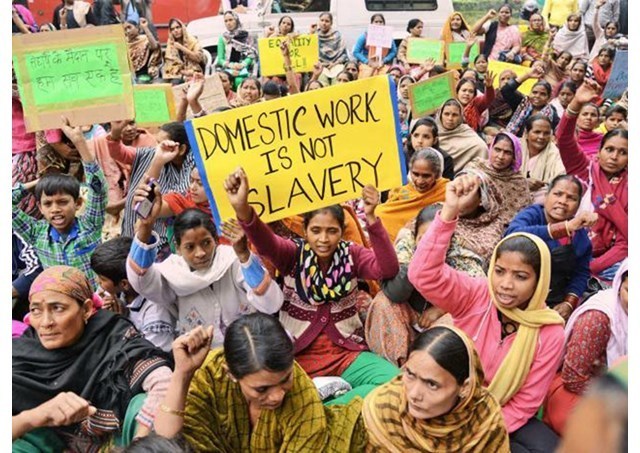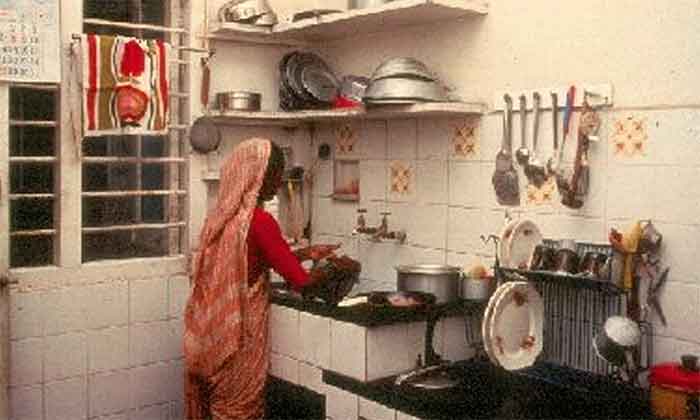
The persistent vulnerability of domestic workers during lockdown is a phenomenal issue in India. There is a however an intricate relationship between the madam-maid where upper class women and the lower class maid have got class based relation which is quite historical in nature. According to the International Labour Organisation, the terms of employment of domestic workers are often not clearly laid out, and they tend to get excluded from labour legislation in various countries. Poor working conditions, long hours and in some cases violence and sexual exploitation are among the many problems faced by domestic workers. The Domestic Workers’ Convention (C.189), introduced in 2011 and finally ratified in 2013, was aimed at addressing the issues faced by domestic workers in a bid to provide security and dignity of labour and making visible this form of work which has tended to be undervalued, underpaid and marginalized. Women form more than 80% of this workforce, while children tend to not even be counted even when they do perform domestic labour for a remuneration that is much lower than what adults would get.
Distancing a Old phenomena with New Rules
Social Distancing was a hierarchal structure which was highly prevalent throughout ages there was distancing of rich from the poor, higher caste from the lower castes, etc. But lockdown has introduced a new kind of distancing with a lot of prejudices. They are denied the right to work due to pandemic as work from home is not available for them. The uncertainty, the unavailability and the ne ways of abandonment has made them more vulnerable. They are marginalized and pushed to exploitation due to lovkdown.They are more prone to a prejudiced kind of social distancing then the actual social distancing ways. For the house maids the norms of distancing are different.
Circle of Dependency
The ousting of the maid for fear of the virus has led to the breakdown of carefully constructed household structures. It shows how dependent we are on the casual part-time services of domestic helpers. Their ban has disrupted care for the elderly and the work routines of thousands of professional and self-employed people. In many housing societies it began with scanning with temperatures guns, fear of hosing societies which led to ban of cooks, maids, gardeners, etc. As the maids and the master’s share an interdependent relationship after the government eased the lockdown restrictions. The collective fear of the ‘infection’ invading these high-walled safe havens is ensuring their gates continue to be locked for hundreds of families desperate to resume normal life. While the fear among housing complexes regarding corona virus spread is not invalid, can they afford to stay indifferent towards the plight of their domestic help? These are the women and men who work for us on daily basis. We interacted with them every day in the pre-corona world. And one has to also keep in mind that they are in such a grave position because of a disease that was brought to this country, to their neighbourhood, and at their workplace because of the very privileged class that is dependent on them for their comfort.
Facing the Brunt during the Pandemic
Official statistics place the number of domestic workers employed in India at 47.5 lakh, including 30 lakh women, but this is considered as severe underestimation and the true number to be more between two crore to eight crore workers, according to International Labour Organisation website. They are facing a double crisis Coupled with income loss, domestic workers, like many other migrant workers, now face the prospect of being thrown out of their rented accommodations, undergo mental trauma as they living in sheds with no water and proper sanitation facilities. House helps are an indelible part of every housing society, and COVID-19 pandemic has caused several to leave their jobs with homes they had been working in for decades. A tribal domestic worker in koraput, Odisha, India was denied to enter a house for work, due to the fear of pandemic as it may contract to the owner. A maid on anonymity said if I test positive for corona virus who will give me work. There are many perspectives to the problems that the pandemic has given arousal to which needs proper addressal otherwise it affects to their poverty and brings various forms of abuse.
Gender Dimension of Domestic Work
The lopsided structure where women are mostly the domestic workers face the brunt of exploitation, marginalisation, vulnerability and violence. This is leading to feminisation of poverty among the domestic labourers they do suffer from domestic violence by remaining confined to homes they become unpaid and discriminated exposed to marginalisation. Being women they became double discriminated, there is domesticity and substitution of women. The unfortunate lockdown and the rise of deadly virus have led to gender based violence and atrocities against women in the last few months. It’s not only women but also children are suffering and they also suffer the brunt of violence due to the global pandemic. The present pandemic has deepened their problems and enhanced their vulnerabilities. Gender inequalities ought to be addressed alongside other inequalities in a common political space. Though gender is an important social division it is not the only basis of mass political identities that structure political debates. A person in a modern society has multiple identities that of class, ethnicity, race, religion, language and region thus preventing any single identity from becoming decisive.
Helpless and the Helper
The United Nations Population Fund has estimated that there would be around 31 million more cases of domestic violence worldwide if lockdowns continue for another six months. Women are marginally more likely than men to be in non-regular employment and those most likely to lose their work and incomes are casual workers and the self-employed, observed International Labour Organisation (ILO) in its document assessing the Covid-19 impact on employment in India. There are several NGO’S and civil society groups working in India to cater their needs. The domestic workers being helpless, there is a need to value the work of domestic workers and frame effective policies for their reconstruction. In post-COVID world, rethinking livelihoods and laws necessary to help informal sector cope with new norm for the domestic workers and uphold their rights.
Dr Nupur Pattanaik, teaching Sociology in Department of Sociology at Central University of Odisha, Koraput specialises in migration and gender issues.
SIGN UP FOR COUNTERCURRENTS DAILY NEWSLETTER











































